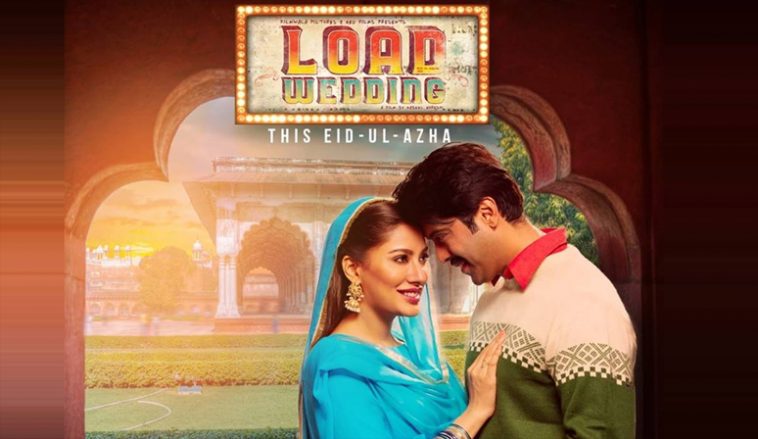There is nothing better than watching an underdog film which ends up beating your expectations. Load Wedding is one such film, which through the course of its narrative, captures your attention with its well-crafted characters, a fast-paced screenplay which springs some surprises, and a heartfelt social message. By the time the movie wraps up, you are sold on the film’s take-away themes and the characters stay with you as you drive from the theater.
In the footsteps of his successful 2016 venture Actor in Law (which incidentally also starred Load Weddingi’s lead pair), Nabeel Qureshi with Load Wedding once again ventures in the romantic comedy genre, albeit this time the social issue it highlights takes center-stage. Balancing the seriousness with the lightheartedness of a romantic comedy is a tricky act to execute. In Load Wedding, the underlying social themes are well knit into the lighthearted but socially relevant script penned by Qureshi, Fizza Ali Mirza and Moshin Abbas Haider. The film might also surprise those in the audience who are expecting another big ticket commercial venture in the tradition of Filmwala’s previous productions Actor in Law and the Na Maloom Afraad series. While it might not be as grand in its execution, that by no means implies that the movie’s plot and script are lacking in ambition.
The film is set in small-town Punjab, and follows the affairs of a mohalla electrician/lighting technician (Raja, played by Fahad Mustafa) who falls in love with a recently widowed polio-worker (Mahwish Hayat as Meerab), and who simultaneously has to bear the responsibility of getting his older sister married. The screenplay has been developed well, incorporating elements of rural Punjab to give it an authentic flavor. The first half goes by in a jiffy, while in the second half the plot takes some unexpected twists and turns, leading the film to its grand finale which boasts (quite literally) of some firecrackers of its own.
On the acting front, the performances from the leads are rock-solid — and frankly nothing less was expected either. Fahad Mustafa does well as the small-town romeo with a heart of gold. He can emote the pathos of a lovelorn soul just as well as exuding the innocence and giddy-heartedness of the eternal optimist that Raja is. Mustafa makes a point to not go overboard. He gives his character the right linguistic touches and body language that embellish his performance as one of the finest in the film.
Mahwish Hayat has every bit as meaty a role as Fahad Mustafa and carries her act with aplomb. Her character goes through all the entire gamut of emotions from anger, sadness, and betrayal to happiness and euphoria. Hayat makes full use of the opportunity, excelling in especially the emotional sequences. In the initial reels, she convincingly emotes the anguish of a widow struggling to find her place in the society and then later does well as the newly married daughter-in-law trying to make the best of a bad situation. The film also makes ample use of her excellent dancing skills in the mehndi number “Mundey Lahore De” demonstrating that Hayat is the complete package when it comes to delivering performance for the big screen. Supporting performances by Samina Ahmed, Noor-ul-Hassan and Ehtashamuddin are noteworthy too. Faiza Hassan who enacts the role of Raja’s sister (the ubiquitous Baby baji) also deserves a special mention.
On the technical front, the film boasts of a rich cinematography by ace DOP Rana Kamran. The frames are earthy and raw, and capture the monsoon-laden, decaying brickwork and haphazard mohallas of small town Punjab just as well as the open vistas, heritage buildings and wheat fields. The artful photography lends well to the rustic, Punjab flavored soundtrack and background score (composed by Shani Arshad), which comes alive on screen.
This is not to say the movie is devoid of any flaws. The audience will be disappointed if they are expecting another Na Maloom Afraad or Actor in Law, where the lighthearted narrative takes precedence over the more weighty issues — the opposite is the case here, especially in the film’s latter reels. Also, the movie may come across as preachy to some – the social issue it attempts to highlight pretty much becomes the driver of the movie’s plot in its second half, and the proceedings become a tad-bit tedious by the time the end-credits role. Coming to the music, the soundtrack did have plenty of scope for a chartbuster, which unfortunately is missing in action here. Also, the narrative would have benefitted from snipping out 10 minutes or so.
The issue-centric narrative and serious social themes of the film notwithstanding, Qureshi retains his trademark tongue in cheek style, and we see a bunch of zany characters make their appearance on screen as the movie’s plot thickens, such as the game-show host modeled on Amir Liaqat. With Load Wedding, Qureshi proves that he is a deft auteur of the romantic-comedy as well as the social themed-genre, maturely handling both the areas of the film.
Load Wedding Review
-
Verdict
Summary
Load Wedding is a wholesome Eid entertainer. While it may not have all the bells and whistles of its two big-budget competitors, this is a film with a heart in the right place, with an engaging screenplay and good performances to boot. Watch it till the end, and it is bound to win you over.



Comments
0 comments